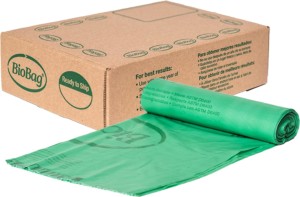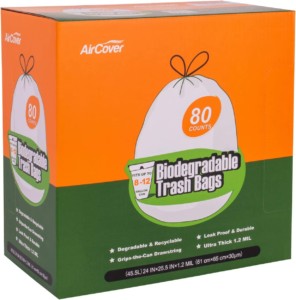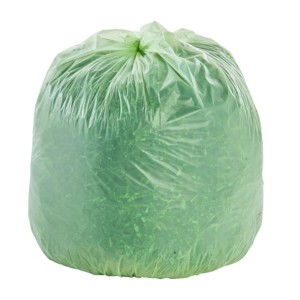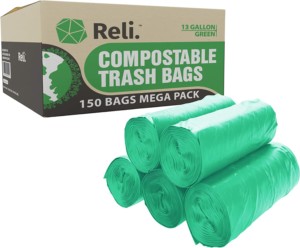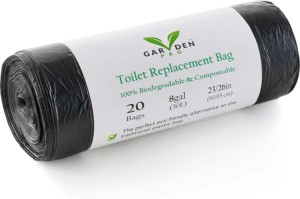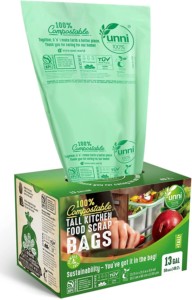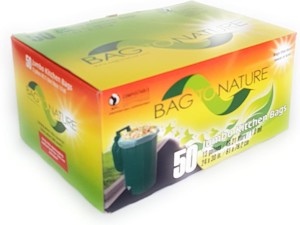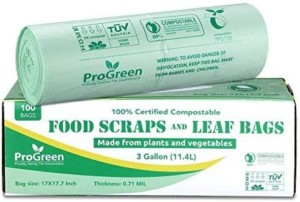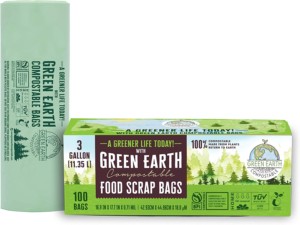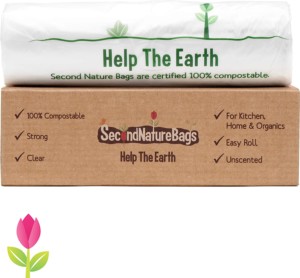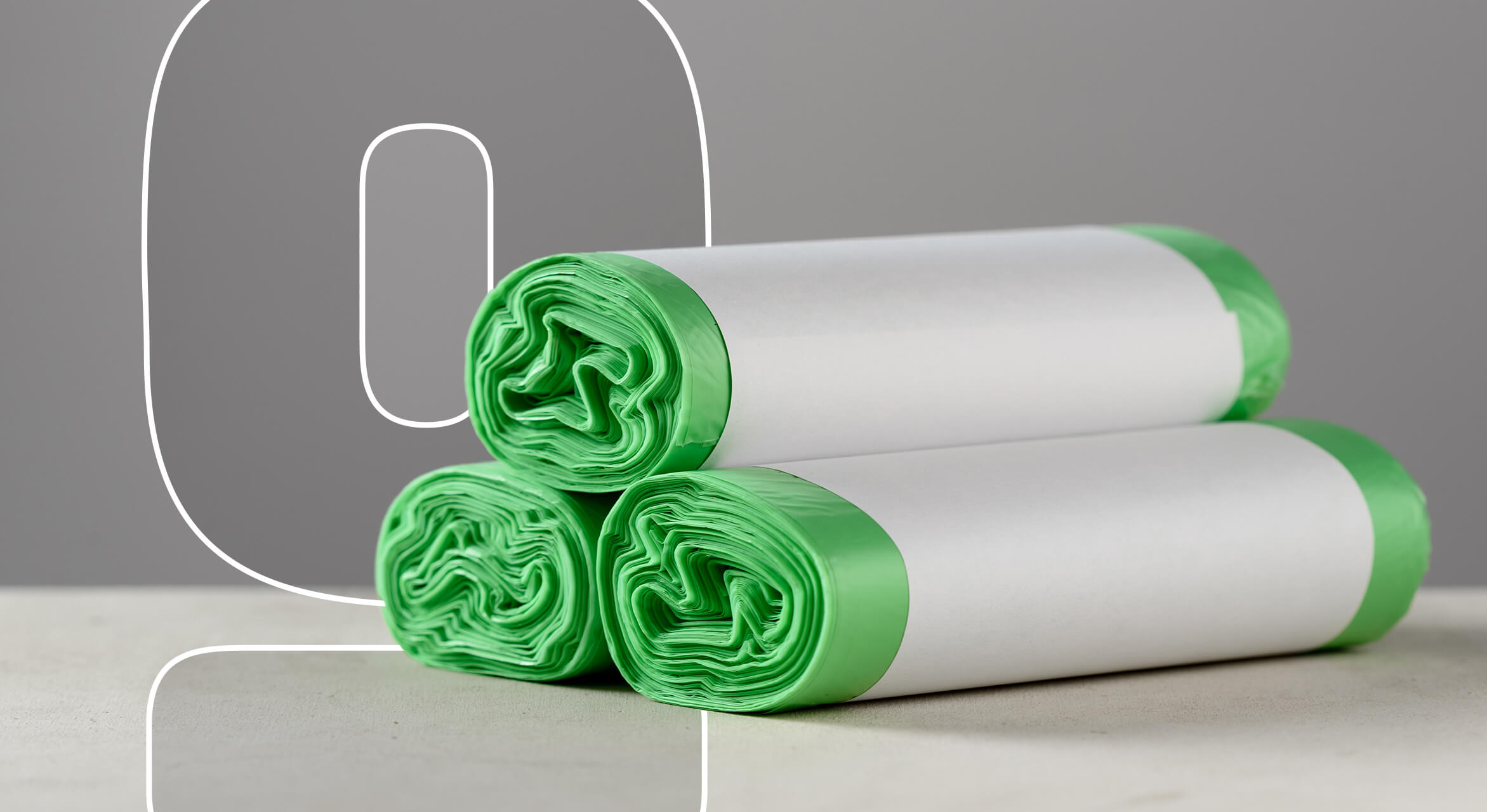
The Top 10 Biodegradable Trash Bags Products and Brands
We are reader-supported. When you buy through links on our site, we may earn affiliate commission.
Plastic pollution is a buzzphrase in the media that generates awareness of ecological degradation. An increasing number of individuals are seeking sustainability-enhancing products. People can improve the eco-friendliness of their homes by adopting biodegradable trash bags.
The pandemic significantly increased the awareness of at-home waste production. It influenced many homeowners to take action, altering their consumption patterns. Before evaluating the top products on the market, we must examine the conventional versions’ ecological effects.
Why Should You Use Biodegradable Trash Bags?
Many people practice efficient recycling techniques, sorting their products and cleaning out food containers before placing them in their bins. Unfortunately, individuals can only do so much to prevent pollution. Over 40% of plastic products on the market are single-use.
Companies that generate nonreusable containers and bags contribute to environmental degradation. Nearly 8 million tons of single-use plastic pollutes the ocean annually. Over time, they break down and become microplastics.
Microplastics harm marine ecosystems. Zooplankton’s growth and reproduction rates decrease in the presence of plastic pollution. Other species consume the materials, disrupting natural hormone cycles.
Inefficient plastic production methods also affect the environment. Developing resin, manufacturing plastic and transporting materials all produce air pollution. A 500-milliliter water bottle generates 82.8 grams of greenhouse gas emissions in production.
When emissions invade the atmosphere, they alter its organic composition. Earth relies on consistent elements to generate life-sufficient surface temperatures. Naturally, it absorbs solar radiation, creates heat, warms the surface, reobtains excess energy, and sends it to space.
Greenhouse gases have a higher sunlight-to-heat exchange rate. They also keep heat in the environment for extended periods. Over time, the entrapment and overproduction of warmth raise Earth’s temperature.
Trash bags are made from high-density polyethylene plastics. The material consists of a complex semicrystalline structure that is difficult to break down. Unlike other plastic materials, it does not absorb solar or ultraviolet radiation, preserving its original form.
Manufacturers evaluated the atmospheric and surface-level pollution associated with trash bag plastics and developed a sustainable alternative. They generated biodegradable versions that eliminate microplastic production. The materials also generate fewer greenhouse gas emissions during the manufacturing process, enhancing climate change prevention efforts.
What to Look for in Biodegradable Trash Bags
When evaluating different biodegradable trash bags on the market, you can ensure their efficiency by raising your awareness. Eco-conscious individuals want a bag that will decompose and create zero environmental impacts. They also need the product to remain intact while serving its in-home purpose.
Some companies capitalize on the eco-consumerism movement, misleading customers with conservation-sounding labels. Greenwashing can cloud a consumer’s judgment, persuading them to purchase nonbiodegradable products. Individuals can limit misinformed consumption by looking for authentic certifications.
The Biodegradable Products Institute (BPI) certification appears on regulated products. Companies must pass various assessments and evaluations before receiving the certificate. Consumers can ensure the sustainability of biodegradable products with the BPI label.
Authentic green trash bags should also contain no polyethylene. Many products label their material use on the front of their packaging. They substitute the environmentally degrading material with corn starch, enhancing durability and effectively decomposing over time.
As the demand for environmentally protective products increased, various companies responded. They generated reliable and eco-friendly alternatives to plastic trash bags. We will evaluate the top products on the market, helping you access the most sustainable versions.
1. BioBag
BioBag produces biodegradable and compostable trash bags for residential use. They are made from renewable crop starches, easily decomposing in soil over time. Individuals may utilize the bags for lining trash cans or compost bins, eliminating their reliance on polyethylene.
A conventional supply of BioBags comes with 100 products containing the BPI certification. They are recommended on various websites because of their efficiency and reliability. The trash bags also contain zero GMOs and come in a recyclable cardboard box.
2. Aircover
Aircover also develops 100% biodegradable trash bags. Its products are thick, protecting against rips and leaks. They also decompose into water and gas when placed in soil, eliminating surface pollution.
The biodegradable bags can hold up to 66 pounds of waste, expanding their diversity of uses. A traditional supply contains 80 eight- to 12-gallon bags. They also come in a recyclable cardboard container, generating less waste.
3. EcoSafe
EcoSafe is a zero-waste company reinventing reliable products that enhance environmental sustainability. All of its products are biodegradable and compostable, replacing conventional plastic materials. The company also works to educate customers about their consumption patterns’ effects.
The bags break down in 10 to 45 days and are non-petroleum based. They contain the BPI and U.S. Composting Council certifications. One pack comes with 45 bags, holding 13 gallons of waste each.
Additionally, the manufacturing facilities support blind and visually impaired Americans. The bags can line a garbage or compost bin, increasing their diversity. When using EcoSafe products, individuals can decrease the amount of plastic in landfills.
4. Reli.
Reli. is a bag and container company that jumped on the eco-friendly bandwagon. It creates strong kitchen trash bags that hold 16 gallons of waste. The material is biodegradable and compostable and is derived from plant materials.
The green bags are leakproof, supporting residential and commercial uses. One megapack contains 150 trash bags, decreasing transportation emissions over time. The company received a four out of five-star rating for efficiency and reliability.
5. Garden Pro
Garden Pro generated a biodegradable bag for various uses. Individuals can utilize the products for conventional kitchen purposes, large-scale bins, gardening, campsites, and more. The plastic-free product holds up to 13 gallons of waste and contains 20 bags in a traditional supply.
They are odor and leakproof, increasing their durability and decreasing messes. The bags are made from plant-based resin, vegetable oils, and other compostable materials. A supply also comes without packaging, which reduces waste production and increases the sustainability of the product.
6. UNNI
UNNI also crafted biodegradable kitchen bags containing zero polyethylene. One pack comes with 50 13-gallon bags, limiting reliance on plastic products. It attained the BPI certification using 100% plant starch materials.
The nontoxic bags last for nine months, offering durable waste containment. UNNI recommends that individuals store their products in cool, dry locations to increase their longevity. The bags are also compostable and come in a recyclable cardboard container.
7. Bag-To Nature
Bag-To Nature generated a 100% biodegradable and compostable tall kitchen bag. Like the product listed above, the company recommends individuals store the bags in cool, dry places. They also encourage customers to purchase as many products as they can consume in six to nine months.
The biodegradable trash bags hold the BPI certification and use strong materials. They are leakproof and remain intact during their use in the kitchen. A traditional supply contains 50 13-gallon bags for efficient usage.
8. ProGreen
ProGreen also produces reliable, biodegradable trash bags. Its products are 0.71 millimeters thick, limiting their ability to leak and tear. They hold the BPI certification and meet New York and California sustainability regulations.
The bags are safe for home composting and remain intact during their usage. A conventional supply contains 100 3-gallon bags. They come in a recyclable cardboard container.
9. Green Earth
Green Earth generates biodegradable food scrap bags for residential use. They are 0.75 millimeters thick, offering optimal strength and reliability. The product also holds the BPI and home compost safety certifications.
The biodegradable bags hold 3 gallons of waste, fitting most tall garbage bins. The material releases water and gas during decomposition, increasing its sustainability. A traditional supply has 100 bags in a recyclable container.
10. Second Nature
Second Nature also crafts 100% biodegradable and compostable trash bags. They are made from plant-based materials, like sugar cane, vegetable oils, and plant starches. The bags hold 3 gallons of food scraps and are 0.75 millimeters thick.
They are 100% plastic-free and hold the BPI and home compost safety certifications. Second Nature bags use zero chemical additives or colors. They also increase ocean and soil safety.
What Are Some Additional Plastic Reduction Methods?
Homeowners can significantly decrease their contribution to plastic pollution when adopting biodegradable trash bags. They can further the sustainability of their property by reducing all single-use plastic purchases. Consumers can carry their goods by hand rather than buying new reusable bags that generate emissions during production.
Many products already come with protective packaging, limiting the need for additional bags. Individuals can carry small orders to their vehicles by hand or in a cart. You may also reuse old bags for groceries, trash or picking up after your pets.
Additionally, customers can bring their own reusable silverware to restaurants that provide single-use versions. When you are ordering takeout, arrive early with glass containers to limit the company’s plastic use. Reusable water bottles also help reduce plastic pollution.
Bring reusable containers whenever you can. You can carry a metal water bottle with you when you travel, refilling it at public fountains rather than purchasing plastic bottles. You may also limit coffee cup-derived pollution by bringing a reusable version.
The Final Word on Biodegradable Trash Bags
American consumers can vote with their dollars, changing the market over time. Transitioning your reliance on biodegradable products can generate a higher demand, decreasing companies’ use of ecologically degrading plastics. You can also talk to your local eateries and stress the importance of using green products.
The restaurant industry generates high volumes of plastic waste. When they use paper straws, reusable cups, and biodegradable trash bags, they can conserve the environment. If society works together, small alterations can make a significant impact.
Share on
Like what you read? Join other Environment.co readers!
Get the latest updates on our planet by subscribing to the Environment.co newsletter!
About the author

Jane Marsh
Starting from an early age, Jane Marsh loved all animals and became a budding environmentalist. Now, Jane works as the Editor-in-Chief of Environment.co where she covers topics related to climate policy, renewable energy, the food industry, and more.
